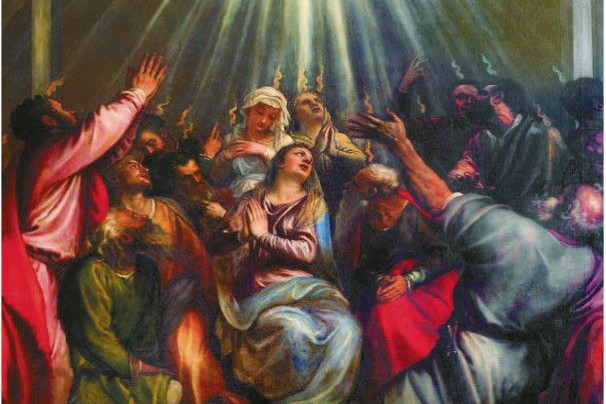
Mary and the Pentecost
05-19-2024Weekly ReflectionFr. Tony Okolo C.S.Sp., V.F.Beloved Parishioners,
As I stated in my last Pastor’s Corner, I would be sharing reflections on some Church’s feasts and events during, my vacation, thus this week I wish to share a reflection on Mary’s role on Pentecost today. The Pentecost which we celebrate 50 days after Easter Sunday, taken away from its Jewish origin and significance, is regarded as the birthday of the Church remarkably because of the outpouring of the Holy Spirit on the Church which took place on that day.
Luke’s description of the first Christian community of Jerusalem includes the presence of Mary (Acts 1:12-14). She is among the central characters that form the bridge between the story of Jesus and the path of the nascent Church. This explains why in 2018, Pope Francis instituted the feast of ‘Mary, Mother of the Church’ to be celebrated on the Monday following the solemnity of Pentecost. In this way he stresses Mary’s maternal role in the newborn Church. The Lukan account from Acts 1:14 includes one of the Church’s first affirmations regarding Mary. She is presented as “the Mother of Jesus.” Hence, we see that although Peter is the head of the Church (Matt 16:18), Mary represents the heart of the group, the unifying core of all who have come together to pray and prepare for the coming of the Paraclete. Here we affirm the teaching of John Paul II that “the Marian dimension of the Church precedes the Petrine dimension, although both are complementary” (Address, 12/22/87).
Mary was the trust insurance of the petrified Christian community and a sign of hope to them because she had already experienced the working of the Holy Spirit and she is very familiar with Him. It was due to His creative power that she could become a virginal mother. In Lk 1:38 the angel described to Mary: “The Holy Spirit will come on you, and the power of the Most High will overshadow you. So, the holy one to be born will be called the Son of God.” In Luke 1:41 “When Elizabeth heard Mary’s greeting, the baby leaped in her womb, and Elizabeth was filled with the Holy Spirit.” Here we see her guiding the frightened apostolic cenobite who have learned recently to trust no one among themselves after having experienced the harrowing betrayal of Judas Iscariot (Mt 26:14-16), the faltering and floundering of Peter the head (Lk 22:54-62), and the obstinate doubt of Thomas manifested after the resurrection (John 20:24-29). But with them was Mary, the plenitude of grace and trust who followed Jesus faithfully from Nazareth to Golgotha and thus merited the Apostle’s confidence. They had seen her prod her Son to an early miracle in Cana after admonishing them “Do whatever he tells you” (John 2:5). Little wonder Pope Benedict XVI exhorts that, “there is no Church without Pentecost and no Pentecost without the Virgin Mary” (Regina Coeli, 5/23/2010).
The Holy Spirit invites us to gaze upon Mary, to know her and to love her. As Pope John Paul II said, “As the bond with Mary grows deeper, so the action of the Spirit in the life of the Church becomes more fruitful.” (Dec. 9, 1998). Mary shows us how to cooperate with the Holy Spirit’s gifts. The seven gifts of the Holy Spirit respond to seven essential needs that a human person has in life in general and in the spiritual life in particular. Mary is the one who shows us best how to cooperate with these gifts. The gifts of the Holy Spirit are wisdom, understanding, counsel, fortitude, knowledge, piety, and fear of the Lord. Mary, again, is our exemplar in living them out. Mary not only leads us to a Christian way of life that bears fruit, but she also models for us a continual reliance on the Holy Spirit for the carrying out of our personal mission.
Christ, following His ascension, directed his apostles to the Upper Room where He had instituted two key sacraments for the birth of the Church: the Eucharist, and the sacrament of Holy Orders—the priesthood. Christ sent them to the Upper Room to be near Mother Mary who would prepare them to receive and respond to the Holy Spirit in an altogether new way of holy conviction. Since Mary was present to assist the Apostles in their sacramental endeavors, we must continue to invoke the motherly intercessions of Mary to enable us to remain faithful to our own sacramental life. Our novena to the Holy Spirit during which we reenact the Apostle’s prayer in the Upper Room usually falls into the context of the May devotion to our Blessed Mother and this points our mind to the need to join our prayers with that of Mary, the mother of Christ and emulate her devotion to the Holy Spirit for our own spiritual growth and flourishing. Mary welcomed God, physically and spiritually. It is thus a task for we Christians to always give God welcome. We give God welcome by reading His word, receiving His sacraments, and by living a life of charity as a gift of self for others. We welcome God in our neighbor through works of mercy.
Finally, we pray for our Mother Mary to help us by turning our hearts to her Son in the Holy Eucharist. Pope Benedict XVI teaches that “The Eucharist is a ‘perpetual Pentecost’ since every time we celebrate Mass we receive the Holy Spirit who unites us more deeply with Christ and transforms us into Him.” Hence, through Mary, we shall achieve that spiritual support only her motherly intercession can afford.
BACK TO LIST